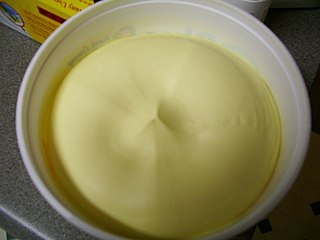
The United States Food and Drug Administration is a federal agency of the Department of Health and Human Services. The FDA is responsible for protecting and promoting public health through the control and supervision of food safety, tobacco products, caffeine products, dietary supplements, prescription and over-the-counter pharmaceutical drugs (medications), vaccines, biopharmaceuticals, blood transfusions, medical devices, electromagnetic radiation emitting devices (ERED), cosmetics, animal foods & feed and veterinary products.

A dietary supplement is a manufactured product intended to supplement a person's diet by taking a pill, capsule, tablet, powder, or liquid. A supplement can provide nutrients either extracted from food sources, or that are synthetic. The classes of nutrient compounds in supplements include vitamins, minerals, fiber, fatty acids, and amino acids. Dietary supplements can also contain substances that have not been confirmed as being essential to life, and so are not nutrients per se, but are marketed as having a beneficial biological effect, such as plant pigments or polyphenols. Animals can also be a source of supplement ingredients, such as collagen from chickens or fish for example. These are also sold individually and in combination, and may be combined with nutrient ingredients. The European Commission has also established harmonized rules to help insure that food supplements are safe and appropriately labeled.

Margarine is a spread used for flavoring, baking, and cooking. It is most often used as a substitute for butter. Although originally made from animal fats, most margarine consumed today is made from vegetable oil. The spread was originally named oleomargarine from Latin for oleum and Greek margarite. The name was later shortened to margarine.
Food quality is a concept often based on the organoleptic characteristics and nutritional value of food. Producers reducing potential pathogens and other hazards through food safety practices is another important factor in gauging standards. A food's origin, and even its branding, can play a role in how consumers perceive the quality of products.

Hazard analysis and critical control points, or HACCP, is a systematic preventive approach to food safety from biological, chemical, and physical hazards in production processes that can cause the finished product to be unsafe and designs measures to reduce these risks to a safe level. In this manner, HACCP attempts to avoid hazards rather than attempting to inspect finished products for the effects of those hazards. The HACCP system can be used at all stages of a food chain, from food production and preparation processes including packaging, distribution, etc. The Food and Drug Administration (FDA) and the United States Department of Agriculture (USDA) require mandatory HACCP programs for juice and meat as an effective approach to food safety and protecting public health. Meat HACCP systems are regulated by the USDA, while seafood and juice are regulated by the FDA. All other food companies in the United States that are required to register with the FDA under the Public Health Security and Bioterrorism Preparedness and Response Act of 2002, as well as firms outside the US that export food to the US, are transitioning to mandatory hazard analysis and risk-based preventive controls (HARPC) plans.

Ear candling, also called ear coning or thermal-auricular therapy, is a pseudoscientific alternative medicine practice claiming to improve general health and well-being by lighting one end of a hollow candle and placing the other end in the ear canal. Medical research has shown that the practice is both dangerous and ineffective and does not functionally remove earwax or toxicants, despite product design contributing to that impression.

Herbal medicine is the study of pharmacognosy and the use of medicinal plants, which are a basis of traditional medicine. With worldwide research into pharmacology, some herbal medicines have been translated into modern remedies, such as the anti-malarial group of drugs called artemisinin isolated from Artemisia annua, a herb that was known in Chinese medicine to treat fever. There is limited scientific evidence for the safety and efficacy of many plants used in 21st-century herbalism, which generally does not provide standards for purity or dosage. The scope of herbal medicine sometimes include fungal and bee products, as well as minerals, shells and certain animal parts.

Current good manufacturing practices (cGMP) are those conforming to the guidelines recommended by relevant agencies. Those agencies control the authorization and licensing of the manufacture and sale of food and beverages, cosmetics, pharmaceutical products, dietary supplements, and medical devices. These guidelines provide minimum requirements that a manufacturer must meet to assure that their products are consistently high in quality, from batch to batch, for their intended use. The rules that govern each industry may differ significantly; however, the main purpose of GMP is always to prevent harm from occurring to the end user. Additional tenets include ensuring the end product is free from contamination, that it is consistent in its manufacture, that its manufacture has been well documented, that personnel are well trained, and that the product has been checked for quality more than just at the end phase. GMP is typically ensured through the effective use of a quality management system (QMS).

Maltodextrin is a name shared by two different families of chemicals. Both families are glucose polymers, but have little chemical or nutritional similarity.

The regulation of therapeutic goods, defined as drugs and therapeutic devices, varies by jurisdiction. In some countries, such as the United States, they are regulated at the national level by a single agency. In other jurisdictions they are regulated at the state level, or at both state and national levels by various bodies, as in Australia.
Nutraceutical is a marketing term used to imply a pharmaceutical effect from a compound or food product that has not been scientifically confirmed or approved to have clinical benefits. In the United States, nutraceuticals are unregulated, existing in the same category as dietary supplements and food additives by the Food and Drug Administration (FDA), under the authority of the Federal Food, Drug, and Cosmetic Act.

Cranberry juice is the liquid juice of the cranberry – a fruit recognized for its bright red color, tart taste, and versatility for product manufacturing. Major cranberry products include cranberry juice, dried cranberry, cranberry sauce, frozen cranberry, cranberry powder, and dietary supplements containing cranberry extracts.

The Food and Drugs Act is an act of the Parliament of Canada regarding the production, import, export, transport across provinces and sale of food, drugs, contraceptive devices and cosmetics. It was first passed in 1920 and most recently revised in 1985. It attempts to ensure that these products are safe, that their ingredients are disclosed and that drugs are effective and are not sold as food or cosmetics. It also states that cures for disease listed in Schedule A, cannot be advertised to the general public.
Hydroxycut is a brand of dietary supplements that is marketed as a weight loss aid. Hydroxycut was originally developed and manufactured by MuscleTech Research and Development; MuscleTech was sold to Iovate Health Sciences in 2003–2004 and declared bankruptcy in 2005; Iovate continues to use MuscleTech as a brand to market Hydroxycut.
The term natural health product (NHP) is used in Canada to describe substances such as vitamins and minerals, herbal medicines, homeopathic preparations, energy drinks, probiotics, and many alternative and traditional medicines. A 2010 survey showed that 73% of Canadians consume NHP on a regular basis. NHP are obtainable without a prescription and are required to be safe to be used as an over-the-counter product.
The use of pesticides in Canada is regulated by the Pest Management Regulatory Agency, a division of Health Canada via the Pest Control Products Act. Pesticides are used predominantly by the agricultural sector. In 2016, 20% of reported pesticide sales were non-agricultural sector products, and just under 5% were domestic sector products.

An expiration date or expiry date is a previously determined date after which something should no longer be used, either by operation of law or by exceeding the anticipated shelf life for perishable goods. Expiration dates are applied to selected food products and to some other manufactured products like infant car seats where the age of the product may impact its safe use.
Genetic engineering in North America is any genetic engineering activities in North America
Consumer Health Laws are laws that ensure that health products are safe and effective and that health professionals are competent; that government agencies enforce the laws and keep the public informed; professional, voluntary, and business organizations that serve as consumer advocates, monitor government agencies that issue safety regulations, and provide trustworthy information about health products and services; education of the consumer to permit freedom of choice based on an understanding of scientific data rather than misleading information; action by individuals to register complaints when they have been deceived, misled, overcharged, or victimized by frauds.










